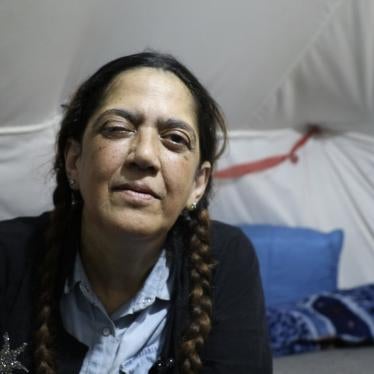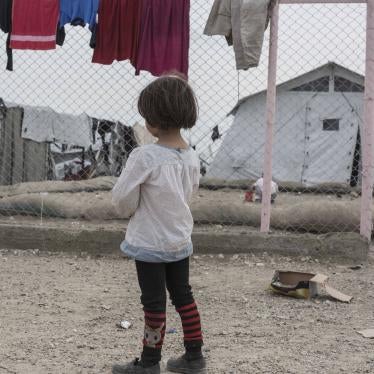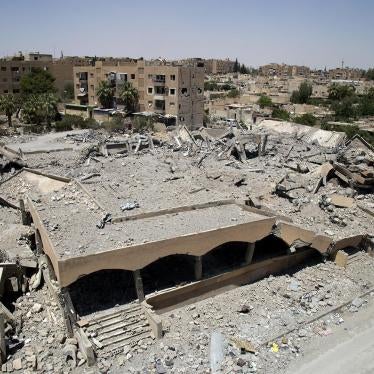Sarah Margon
Washington Director, Human Rights Watch
Senate Foreign Relations Committee
Subcommittee on International Operations and Organizations, Human Rights, Democracy and Global Women’s Issues
December 9, 2014
ISIL’s Reign of Terror: Confronting the Growing Humanitarian Crisis in Iraq and Syria
Madam Chair, members of the Committee, thank you for inviting me to testify this morning. It is a great pleasure to be here. Per your request, I would like to share some insights from my recent trip to Iraq and then touch on Syria, where the Islamic State in Iraq and al-Sham, or ISIS, is one of many groups, including the Syrian government, perpetrating gross and widespread violations of international human rights and humanitarian law.
Human Rights Watch has been documenting ISIS-related abuses in Syria and Iraq since August 2013. While we have not traveled to ISIS-held territory because of security concerns, we have conducted extensive interviews with those that have fled the armed group as well as with many people who are still living in areas under their control. Until recently, we made numerous trips to northern Syria. We still travel regularly to interview Syrians and Iraqis in Jordan, Turkey, and Lebanon in addition to many parts of Iraq, where I spent a week in early October.
By now, ISIS’ extraordinary brutality is well known. Their campaign of killings is remarkably gruesome—they hide nothing, promote their atrocities via social media, and make clear they don’t subscribe to the same norms, values, laws, and standards that serve to guide the international community. Instead, ISIS employs an overt strategy of cruelty to sow fear and subdue populations under its control, bolstered by tactics that seem to be a throwback, if you will, to another era.
But ISIS didn’t come from nowhere. In fact, they have been gaining strength for quite some time—taking advantage of the brutal crackdown by Syrian and Iraqi authorities, the marginalization of Sunnis that began over a decade ago after the US invasion of Iraq, and the conflict-related chaos in Syria, to name but a few. Similarly, the rapid territorial gains ISIS made this summer were largely enabled by the discontent that resulted from the Maliki-led government policies that fed a cycle of sectarian violence through exclusion and discrimination.
In early October, I traveled about two hours south of Kirkuk to learn more about the role of government-backed militias in the ground fight against ISIS. My colleague and I had heard numerous anecdotes about the ransacking of Sunni villages by government-back militias after the US-coalition airstrikes helped “liberate” Amerli, a predominately Shia town of approximately 12,000 people under ISIS siege for almost While they did play a role liberating that village, what we learned that day confirmed a devastating picture of relentless arson, destruction, displacement, and killings committed by various militias, with impunity. At the end of our visit, we pulled off the highway to speak with a family displaced by the recent violence. A man in his late 40s, who was living in an abandoned strip mall, told me, “I am no more afraid of Daesh” — the Arabic acronym for the Islamic State — “than I am of the Shia militias and the Iraqi government.”
The circumstances around the post-Amerli siege are emblematic of a larger and deeply worrisome effort underway throughout much of Iraq as it scales up its counterterrorism campaign with support from the United States: crudely empowered Shia militias are being used to punish the Sunni population because of its sect.
In the weeks that followed my visit, our team went to heard consistent
Meanwhile, ISIS preys on vulnerable communities, including those historically concentrated in the Nineveh plains, such as the Chaldo-Assyrian Christians, Shia Shabaks, Turkmen, and Yezidis. These groups have a long history of marginalization but ISIS has intensified this ostracism, labeling them as crusaders, heretics, and devil-worshipers and then threatening them with death if they don’t convert to Islam.
Six weeks ago, I traveled not far from the Syrian border to Dohuk to interview young Yezidi men, women and girls who had recently escaped ISIS captivity. They described harrowing tales of cramped detention, abuse, forced conversion, forced marriage, and sexual slavery. One 15-year-old girl we interviewedwho had only arrived back with her family the day beforewas taken from Mosul to Raqqa, Syria. Along the way, she was detained in four different locations, including in Badoush prison, near Mosul, with hundreds of other Yezidis. While there, she said she saw fighters take more than 100 boys, some as young as six years old, from their mothers. Maybe they were sent to be “re-educated” or maybe to a training camp. It is likely they were all forced to convert; maybe some were killed.
When this girl arrived in Raqqa after her grueling journey, she said she was detained in a private home with about 20 other girls, only to be sold a few days later to an ISIS fighter for about $1000.
Another Yezidi girl we interviewed was held captive with her four sisters, the youngest of whom was 10 years old. She shared the story of another young girl, with whom she was detained and who had been “selected” by an older ISIS fighter. He regularly took her to his home, locked her in a room and told his family he was “helping her with her Islamic education.” Instead, he was beating and raping her.
Our team has also documented ISIS efforts to recruit children as fighters, to encourage them to volunteer for suicide attacks and to force them to learn Sharia (Islamic law) and jihadist ideology.
Madam Chair, as you will recall this past August, President Obama made clear the United States would “not turn a blind eye”[1] to a Yezidi massacre in Iraq. Certainly, there has been increased attention to the plight of the Yezidis, alongside other vulnerable communities in Iraq, but launching a military operation isn’t a sufficient long-term strategy to protect these groups – or any others.
Indeed, thousands of families have already been torn apart; more than 500,000 Yezidis and other religious minorities have been driven from their homes, most to the semi-autonomous region of Kurdistan, which is already suffering under the strain of some 200,000 Syrian refugees and lacks the resources to mount an adequate response.[2]
But it is not only religious minorities who have been displaced. Thousands of Sunni families are also fleeing violence in other parts of Iraq, including in areas recently “cleared” of ISIS that are less accessible and virtually invisible to the international community. Countrywide, there are now more than 1.8 million displaced Iraqis, many of whom have little access to basic services or any meaningful protection.
In Syria, where ISIS has been able to use the chaos of armed conflict to consolidate its powerbase and grow its membership, communities have been reeling from widespread human rights violations by all sides. In fact, the main threat to many civilians does not come from ISIS but from the Syrian governmentwhich continues to brutally target its own population with barrel bombs and other conventional weapons. Healthcare and education systems in rebel-held parts of the country have broken down while nine million people have been driven from their homes. Neighboring countries are swollen with refugees and regional stability is increasingly under threat.
Within this context, US-led airstrikes to counter ISIS are acutely juxtaposed against the absence of any real plan for civilian protection throughout the country, particularly in ISIS-held territory. Here, the issue is not just whether individual strikes have hitor targetedcivilians but also what the cumulative effect will be for Syrians who remain in ISIS-controlled areas, under brutal conditions.
Already, residents of Raqqa are reporting an increase in the price of basic commodities, particularly fuel needed for heating, as a result of the strikes on ISIS refineries. Within days of the first airstrikes in Syria, major protests raised concerns not only about the myopic focus of the US-led campaign but also about the potential for any related civilian deaths to increase ISIS recruitment.
The administration should take this concern very seriously. Just like in Iraq, all the horrors caused by ISISor any of the other armed groups aligned with themare not going to be eliminated by airstrikes. In fact, without a larger conversation about genuine protection measures for Syrians at risk there is a real possibility they could make the situation significantly worse.
Recommendations
The growing crises in Iraq and Syria are distinct but increasingly interlinked. They will require sustained engagement from concerned governments, and the United States in particular, for many years to come. That said, there are some near-term steps Human Rights Watch would like to suggest that could provide a measure of protection and support for those in need.
First, as the administration should publicly commit to investigate airstrikes in both Iraq and Syria in which civilians were casualties in possible violation of the laws of armed conflict, publicly report on the findings, and commit to appropriate redress in cases of wrongdoing. The administration should also consider providing assistance to any civilians harmed in US airstrikes, as was done in Afghanistan. Congress should press the administration to do this and ensure they have appropriate resources.
Second, in both Iraq and Syria, the US needs to take great care as it scales up its engagement with state security forces and armed groups. Comprehensive vetting mechanisms need to be in place to ensure the US is not supporting abusive groups or commandersor that US taxpayer dollars are lost to graft. In general, human rights vetting for security forces needs to be robust, consistent, and incorporated into a wider plan for reform that seeks to build an integrated force with civilian protection at the center of its mandate.
In Syria, the administration has committed to developing such a program for the moderate rebels and, while Human Rights Watch doesn’t take a position on it, we do believe vetting is an essential part of making sure training and weapons do not end up in the wrong hands. It is too early to tell if the initiative will be successful but Congress can play an active role making sure it is consistently applied and regularly monitored.
In Iraq, certain security force units well known for their abusive tactics should be omitted from the reform process until the government takes steps towards remediation. Congress should also press the administration to develop clear policy guidance on how diplomats and military officials can support the Iraqis and other foreign governments to promote accountability. As you may know, the Leahy Law requires the administration to offer related assistance but this area of the law and associated policy are woefully underdeveloped. Finally, on this point, strong congressional oversight will be essential to ensure Baghdad does not funnel US government-issued weapons and equipment to Shia militias or into their own pockets, which appears to be happening already with some regularity.
Third, and specifically with regard to Iraq, there is the need for the US to scale-up support for non-military initiatives throughout the country, whether independent activists, media, relief aid, or civil society organizations. Such support is an important counter balance to military operations and helps promote a culture of oversight and public accountability – both of which are sorely missing.
In northern Iraq, this assistance should include support for local and international organizations to increase medical and counseling services for displaced people who fled ISIS. Programs should be geared towards the confidential needs of people who have survived sexual violence, including comprehensive post-rape care. Access to Iraqis outside Kurdistanand information about the conditions in which they’re livingremains extremely limited. Scaled-up support to impartial groups, including in the Anbar region, should be a priority and would indicate a commitment to all Iraqis.
Finally, when it comes to Syria it is clear that the underlying problem continues to be one of large-scale insecurity. No amount of humanitarian aid can suffice for the absence of greater protection. Nonetheless, the US should redouble its efforts to see UN Security Council Resolution 2139 implemented in a meaningful way. This means leading the Security Council to press for an end to indiscriminate attacks on civilians in Syriaincluding the government’s use of barrel bombscalling on all sides to release civilian detainees – including the thousands of people held by the Syrian government in inhumane conditions, and ensuring relief aid consistently reaches those in need.
Madam Chair, the grim reality is that ISIS is going to be around for the foreseeable future, as are the conditions that have enabled it to thrive. So instead of thinking predominately about military operations against ISIS, there is a need to shift gears and reflect on how the US can do a better job helping civilians find a greater measure of protection while also ensuring US military operations do not inadvertently end up strengthening ISIS appeal to disenfranchised Sunnis. If the US doesn’t take this step, far too many people in Iraq and Syria will continue living in brutal conditions, under constant threat from a wide range of abusive actors, and without sufficient support for their most basic human needs.
Thank you for chairing this important hearing. I’m happy to take your questions.
[1] White House, “Statement by the President,” August 7, 2014, http://www.whitehouse.gov/the-press-office/2014/08/07/statement-president.
[2] UNHCR, “Syria Regional Refugee Response,” http://data.unhcr.org/syrianrefugees/country.php?id=103 (Accessed December 8, 2014).







